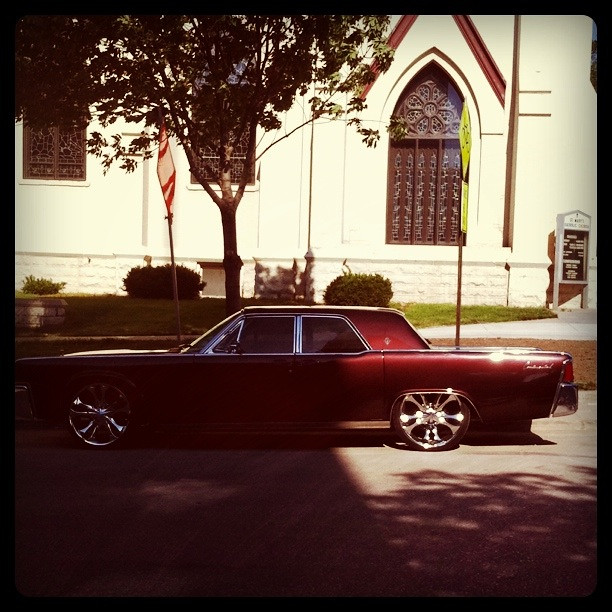Usually, when I tell people the story of finding out my husband was considering becoming the pastor of a church in Nebraska, I tell whoever happens to be listening at the time that I asked H, “Nebraska? Are there any people in Nebraska?” That’s almost the truth. But here’s the real story:
Nine years ago, H and I were living in Pennsylvania. That summer, we drove to share in the celebration of our friend’s wedding in Alabama. We rented a car — a Chevy Malibu. It was the hatchback model and I think it had a sunroof. But, with all of those exits available to me, I was still a captive audience. I tend to believe H planned it that way. Fourteen hours on the road. Each way. And no escape for me.
We’d been driving for hours — and I think perhaps it took H that long to get up the nerve to tell me what was on his mind. The sun had started its downward arc when he said to me, “So…there’s this church in Nebraska…” I don’t know if I caught on right away, or if he had to give me a bit more information. Eventually, however, I realized he was telling me he was going to interview to be the pastor at a church in Lincoln. And I said, “Nebraska? Are there black people in Nebraska?”
Yep. That’s what I asked. It’s what I wanted to know. I also asked if there was anything more than cows and corn in Nebraska. But, mainly, I didn’t want to move to a town or a state where I would forever and always be one of two black people in the room (assuming H would be there with me). When we told our friends we were considering moving to Nebraska, our black friends would ask us, “Nebraska? Are there black people in Nebraska?”
I once read a book by Randy Alcorn, in which two couples were good friends. One couple was white, and the other couple was black. At some point, the topic of race came up while the four friends were together at a restaurant. It’s been a long time since I read the book, so I don’t remember all of the details clearly, but what I do remember is the black man telling his white friends (and this is a paraphrase), “You know, for black people, the issue of race is like a marinade. We are soaked in it. It has become part of our fiber because we deal with it every day. But for white people, the issue of race is like a sauce — something that can be added or not. White people can choose whether or not to deal with it.”
:::
In church Sunday, our congregation looked like the United Nations, or the United Colors of Benetton. It was beautiful. I kept looking around me, trying not to blink in case I missed it. Men and women. Young and old. Brown and black and tan and beige and olive and babies and senior citizens and young adults and middle-aged people and toddlers and school-aged kids and teenagers. Strong and weak and able and those in need of a helping hand or two or ten.
I would have taken a picture, but it wasn’t that kind of moment, you know?
Doing church like this is hard, dirty, beautiful work. We don’t always get it right, and we have the scars to prove it. Doing church like this takes trust, and listening, and committing to believe each one of us hopes the best for the other. It doesn’t mean we won’t get our feelings hurt. It doesn’t mean we won’t miscommunicate. It doesn’t mean we won’t show our true colors and find out they aren’t that pretty after all. Doing church like this means offering unconditional love, a listening ear, and authentic community to — as H put it in his sermon — the “geeks, freaks, lonely, hurting, or whatever your hangup is.” I wrote down that list: geeks, freaks, lonely, hurting, or whatever your hangup is. And then I wrote, “What’s my hangup, Lord?” Because I know I have one or two or ten.
:::
In college, I majored in Communication. I thought I wanted to be a sportscaster. God clearly had different plans for me. The sportscasting plans fell by the wayside, but a lot of what I learned in college stuck with me. I remember something we’ve all learned…whether we’ve been to college or not. It’s the simple fact that communication doesn’t happen without a receiver. If no one is listening, communication isn’t happening. If no one is listening, we’re all just clanging brass or tinkling cymbals.
Sometimes, a listening ear might be the best gift there is. I think it might be the one thing that makes the difference between authentic community and what H called “shallow forms of adhesion” that look like community on the surface, but fall apart like sand through an hourglass, as soon as the going gets tough. I know love is important. Love — agape — is the foundation of true community. But I wonder if love doesn’t look like listening, every now and then?
Note: Tomorrow, The High Calling is hosting Going There: A Conversation About Race, Church, and the Body of Christ, featuring Marcus Goodyear, Dan King, and me. I would be honored if you’d join us. The event begins at 2:00 PM, Central Time, and will be hosted on the #THCLive Google+ Hangouts Event Channel. If you’d like details, or more information, please email me at [email protected].
